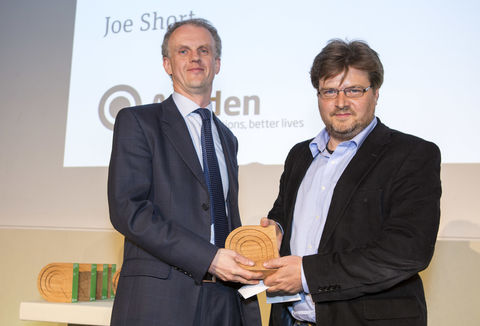My first glimpse of Artificial Intelligence (AI) came as a
seven-year-old. With my parents out, my
grandmother allowed us to watch Stanley Kubrick’s science fiction masterpiece
2001: A Space Odyssey (I suspect against my mum and dads’ wishes). I watched in
horror as a spacecraft’s mission AI became self-aware and defied the wishes of
the crew, in favour of its own malign consciousness. Never has a computer been
quite so disturbing.
It was enough to give me a lifelong suspicion of AI. But I’m
happy to say that the AI that I ‘met’ on my recent assessment
visit to China was the polar opposite of this diabolical device. I visited
Shanghai to see EQuota Energy, set up by the fiercely bright and
determined Charlotte Wang. The company’s work in the field of sustainable buildings has made it a finalist in the 2019 Ashden Awards.
Charlotte’s company is using dazzling science to help tackle the
enormous challenge we face in averting an earth-wide disaster epic of our own –
climate change. At the time of my visit, cyclone Idai was wreaking enormous
devastation in southern Africa. This tragedy was one of the worst
tropical cyclones ever recorded in the Southern Hemisphere. Climate change will
create more of these devastating extreme weather events.
Electronic fingerprinting
Charlotte and her team have developed AI software that
listens for the unique electrical signals generated by devices such as fans,
air conditioning units, industrial machine components or even microwave ovens.
The software tracks and interprets all the electronic noise created by these
devices, as well other data, through a simple box connected to a building’s
smart meters or building management system. Using machine learning, the AI can
distinguish what’s on, what’s off, what’s running inefficiently and what’s about
to malfunction.
So how does this tackle climate change? First, it allows
building managers and service engineers to save 10-20% of their energy costs by
avoiding ‘energy insanities’ such as heating and cooling systems running in
the same place at the same time. Through an interactive dashboard and mobile
app, building managers can now play super-hero by significantly cutting their
carbon emissions.
But there’s more. The AI can direct maintenance tasks to be
focused where they’re needed most, based on the data gathered and resulting
predictions. This cuts labour, equipment and engineering costs, ensuring the
smooth running of the building and doing even more to drive down energy use.
Much more efficient than hoping to catch problems by servicing every piece of
equipment on a monthly or yearly basis. And the careful sharing of anonymised
data mean what the software learns from one building can often be applied to
another, so the more buildings it’s installed in, the cleverer it gets (and
the more carbon is saved).
As cities grow, we need smarter buildings
The huge increase in urbanisation all over the world
presents an enormous challenge. In China 80% of the population – that’s 1
billion people – now live and work in cities, often in buildings that consume
large amounts of energy. It is therefore essential that we get our buildings’
wasteful ways under control.

Impax Ashden Award for Energy Innovation
Demand Logic
Read more

As part of my assessment I met a senior director of a global
hotel management company. He explained that after staff wages, energy is the
single largest cost facing hotels. He said the business offer from EQuota was,
in his experience, totally unique. The company are so confident that the costs of
their system will be recouped in energy savings that they offer a guarantee –
if it doesn’t, they will refund their fees.
The director added that because the system does not need any
equipment to be installed other than the AI box, it satisfies building
engineers nervous about installing third-party kit. These benefits help
convince senior management teams in signing on the dotted line.
Unlike the AI in Kubrick’s film, this is not a dreamed-up
science fiction fantasy. It is based on solid science, much like the work of
UK-based Ashden Award winner, Demand Logic, which is achieving energy savings
of more than 20% in all the buildings it is installed in.
When the desperate captain of the ship in 2001: A Space
Odyssey tries to challenge its AI, the computer responds: “Dave, I am putting
myself to the fullest possible use, which is all I can think that any conscious
entity can ever hope to do.” Thankfully, EQuota’s AI system is channelling its
energies into a less selfish mission.
In fact, we need to see these kinds of systems fitted in all
of our buildings around the world if we are to limit global warming to 1.5
degrees. Achieving that goal is the only way to avoid starring in our own very
real disaster movie.

